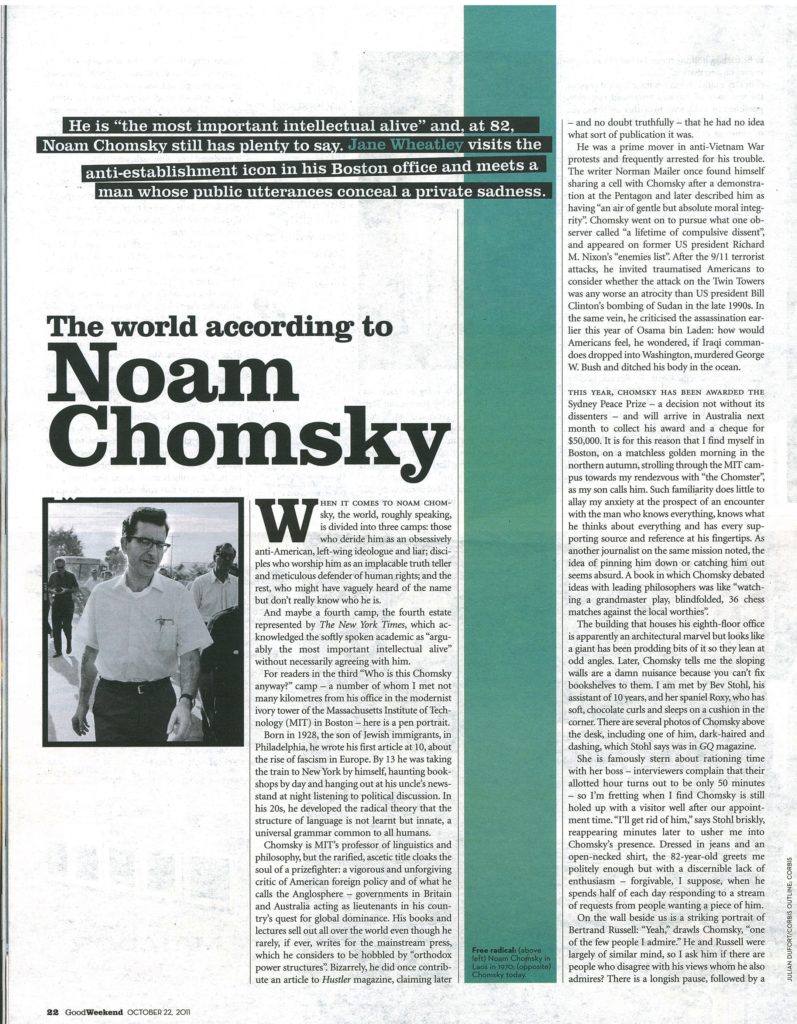UPDATES
Fairfax’s Chomsky and Holocaust Denial whitewash
November 14, 2011 | Tzvi Fleischer

On October 22, the Age and Sydney Morning Herald “Good Weekend” magazine ran a profile written by Jane Wheatley of prominent American linguistics expert, radical author and political activist Noam Chomsky. It is not available online, but was almost wholly complimentary to its subject – so much so that it completely re-wrote the history of one of the most controversial aspects of Chomsky’s long career in public controversy, his 1979 defence of French Holocaust denier Robert Faurisson.
Wheatley asks in the profile, after noting Chomsky’s Jewish background and criticism of Israel and Israeli policy:
…how, I wonder, did he get labelled a Holocaust denier?
It turns out to be a complicated little story: essentially a French academic called Robert Faurisson was suspended from teaching at his university for questioning the existence of Nazi gas chambers. Chomsky, along with other eminences, wrote in defence of the man’s right to free speech. The notion that support for freedom of expression does not imply agreement with the views expressed did not trouble Chomsky’s critics, who gleefully rushed to accuse him of anti-Semitism and denial…
Needless to say, this does not bear even a passing resemblance to the truth about the controversial episode. In fact, Chomsky went way beyond simply defending Faurisson’s right to free speech, penning an essay used in a book edited by Faurisson, and in it declaring that both Faurisson himself and his writings insisting the Holocaust was all a Zionist lie were untainted with antisemitism, despite massive evidence to the contrary. Anyone who wants to understand the real story in this episode in more detail should read this, this, this and this.
However, Wheatley’s version of the story – Chomsky simply defended Faurisson’s right to freedom of speech but was attacked by nefarious enemies who were simply out to get him – is the claim that some of Chomsky’s most fervent disciples tend to make about the issue. (Interestingly, elsewhere in the piece, Wheatley quotes Chomsky talking about “intentional ignorance – when something is not so nice to think about” with respect to the consequences of Western foreign policy. Ironically, this seems to apply as a description of how fervent Chomskyites approach the Faurisson controversy – by not wanting to know about what he actually did and said and preferring to pretend he only defended Faurisson’s right to free speech.)
In any case, I penned a letter to “Good Weekend” setting this matter straight. Saturday’s (Nov. 12) “Good Weekend”, which contained letters commenting on the Chomsky piece, did include a letter taking issue with Wheatley’s incorrect claims on the Faurisson issue by academic Philip Mendes – but it was all of 35 words long. All that Mendes was given room for was to make a bare statement that Chomsky went beyond defending Faurisson’s right to free speech. Since this is hardly an adequate response to the basic factual inaccuracies in the “Good Weekend” piece, here’s my version (with one small correction compared to the version sent to Good Weekend):
Jane Wheatley’s “Good Weekend” story on Noam Chomsky (“The World According to Noam Chomsky”, Oct. 22) completely misrepresented the controversy over Chomsky’s support for French Holocaust denier Robert Faurisson in 1979. This does not concern Chomsky’s writing in “defence of [Faurisson’s] free speech” as Wheatley asserts. It concerns Chomsky’s authorship of an essay which Faurisson included in his book, Memoire en defense, apparently with Chomsky’s acquiescence.
In that essay Chomsky refused to express an opinion on Faurisson’s Holocaust denial claims, but strongly vouched for Faurisson’s motives, stating “I see no hint of antisemitic implications in Faurisson’s work… As far as I can determine, he is a relatively apolitical liberal.” But extensive evidence had apparently already been supplied to Chomsky at the time by the French historian Pierre Vidal-Naquet demonstrating that Faurisson was both strongly antisemitic and a Nazi sympathiser. Elsewhere, Chomsky wrote, “I see no antisemitic implications in denial of the existence of gas chambers, or even denial of the Holocaust.”
Chomsky’s actions in whitewashing Faurisson’s motives strongly call into question his moral judgement, but his critics do not say they make him either an antisemite or a denier, as Wheatley claims.
Dr. Tzvi Fleischer
Australia/Israel & Jewish Affairs Council
Tags: Antisemitism





